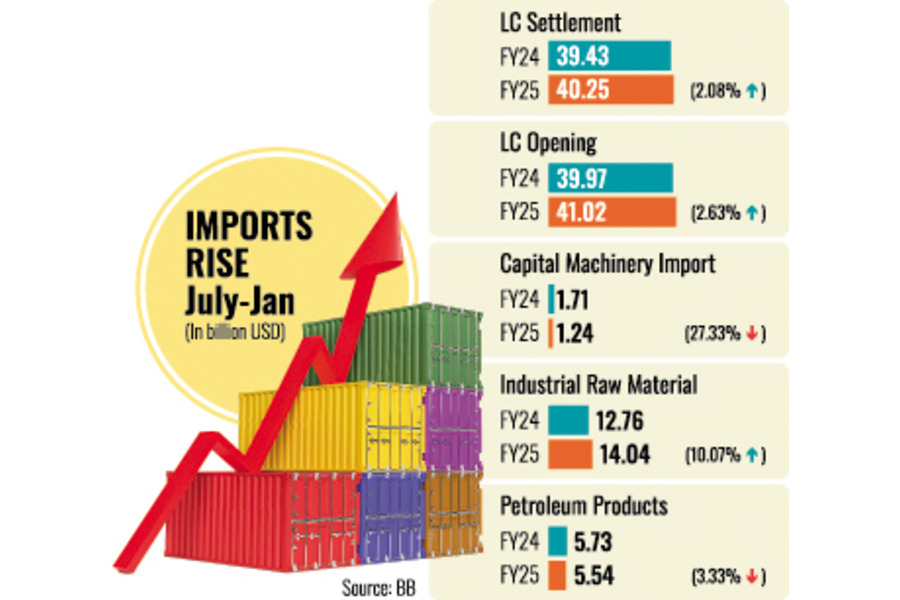
Published :
Updated :

Overall import has witnessed an upward movement in the first seven months of the current fiscal year (FY), 2024-25, ahead of the upcoming fasting month of Ramadan, officials said.
The actual import in terms of settlement of letters of credit (LCs) grew by 2.08 per cent to $40.25 billion from July to January of FY25, according to the central bank's latest statistics.
The figure was $39.43 billion in the corresponding period of FY24.
On the other hand, the opening of fresh LCs, generally known as import orders, rose by 2.63 per cent to $41.02 billion during the period in question of this fiscal from $39.97 billion in FY24.
"The country's overall import increased slightly during the period under review mainly due to the upcoming Ramadan," said Mustafa K Mujeri, executive director of the Institute for Inclusive Finance and Development, on Sunday.
Mr Mujeri, also a former chief economist of the central bank, suggested that policymakers take effective measures to boost imports of capital machinery and intermediate goods to bring dynamism in the economy.
"We need to give a 'big push' to revamp our overall economic activity," the senior economist told the FE, saying that such a move has not been visible yet.
Echoing Mr Mujeri, a senior official of the Bangladesh Bank (BB) said the country's overall import has maintained an uptrend in the last couple of months mainly due to the upcoming Ramadan.
The central bank expects the import of essential items to increase further in the coming months, as it has withdrawn the LC margin and improved the supply of US dollars in the market.
"The central bank along with the government has already taken measures to ensure smooth supply of essential items in the market ahead of Ramadan," explained the BB official.
Normally, essential commodities are imported in large quantities to meet an increased consumer demand during the fasting month.
The central bank also predicts that the current upward trend in imports will continue in the near future as the economic activity is recovering gradually.
However, industrial raw-material imports grew by 10.07 per cent to $14.04 billion during the period of FY25 from $12.76 billion in the same period of FY24, according to the BB data.
Talking to the FE, another BB official said higher imports of industrial raw-materials have helped achieve double-digit growth in export earnings in the first seven months of FY25.
Bangladesh's export earnings grew by 11.68 per cent to $28.97 billion during the July-January period of FY25 from $25.94 billion in the same period of FY24.
The official further said that higher lending rate along with political uncertainty has pushed down capital machinery imports in recent months.
The import of capital machinery-industrial equipment used for production-dropped by 27.33 per cent to $1.24 billion during the period under review, down from $1.71 billion in the same period of FY24.
"Actually, the business community is still maintaining a 'wait and see' policy for making fresh investment particularly for industrialisation to avert their possible financial risks," a senior executive of a leading private commercial bank told the FE while replying to a query.
On the other hand, the import of petroleum products fell by 3.33 per cent to $5.54 billion during the period in FY25 against $5.73 billion in FY25.
Fuel oil import may go up in the coming months slightly due to the seasonal effects, according to a senior official of the Bangladesh Petroleum Corporation.
On 05 September 2024, the BB removed the LC margin on all types of imports, except luxury goods and those produced domestically, with an eye to boosting businesses as well as industrialisation.
Currently, businessmen are allowed to import all types of capital machinery, consumer goods and raw materials on the basis of 'bank-customer relationship' without any LC margin, according to a BB notification.
Yet, importers will have to pay 100-per cent cash margin to open LCs for several luxury goods and import substitutes.
These include motor cars (sedans, SUVs and MPVs), electronic goods, home appliances, gold and jewellery, valuable assets and pearls, apparel, leather goods, jute products, toiletries, furniture, fruits and flowers, non-cereal food, processed food, alcohol and tobacco.
siddique.islam@gmail.com


 For all latest news, follow The Financial Express Google News channel.
For all latest news, follow The Financial Express Google News channel.